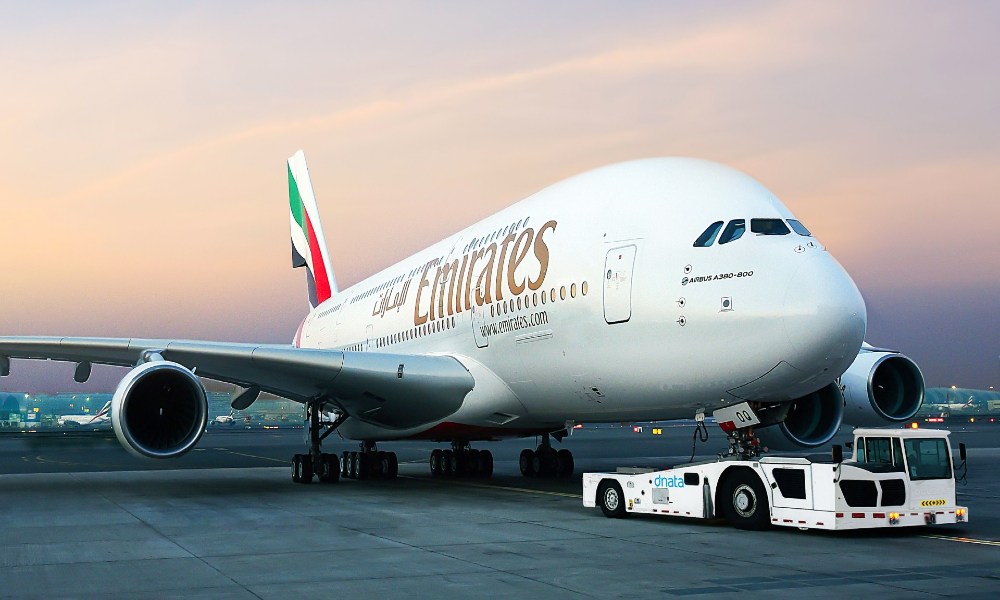
Emirates SkyCargo puts up a stellar show despite Group’s overall loss in FY21
The Emirates Group announced its first year of loss in over 30 years caused by a significant drop in revenue, fully attributed to the impact of Covid-19 related flight and travel restrictions throughout its entire financial year 2020-21.

The Emirates Group announced its first year of loss in over 30 years caused by a significant drop in revenue, fully attributed to the impact of Covid-19 related flight and travel restrictions throughout its entire financial year 2020-21.
Even as the Group’s revenues declined, Emirates SkyCargo put up a robust performance by rapidly responding to new demand in a changed global marketplace, contributing to 60 percent of the airline’s total transport revenue. With the strong demand in air freight throughout the year, Emirates’ cargo division reported a revenue of AED 17.1 billion ($ 4.7 billion), an increase of 53 percent over last year. Freight yield per Freight Tonne Kilometre (FTKM) increased strongly by 88 percent, due to the unique pandemic situation which led to significantly reduced cargo capacity in the market worldwide.
Tonnage carried decreased by 22 percent to reach 1.9 million tonnes, due to the reduced available bellyhold capacity for the entire year. At the end of 2020-21, Emirates’ SkyCargo’s total freighter fleet stood unchanged at 11 Boeing 777Fs.
Emirates SkyCargo quickly scaled up operations and rebuilt its cargo network to meet strong demand from shippers who faced a capacity crunch when the pandemic forced airlines to drastically reduce flights. It supplemented its existing freighter capacity by bringing into service 19 “mini freighters” - modified Boeing 777-300ER passenger aircraft with seats in the economy cabin removed to make room for more cargo. The cargo division also introduced new loading protocols to safely utilise overhead bins and passenger seats to carry cargo.
In addition to supporting global supply chains for food, medical and other trade items, Emirates SkyCargo also tapped on its pharma capabilities and infrastructure to support the worldwide distribution of COVID-19 vaccines and humanitarian relief to Lebanon in the aftermath of the Port of Beirut explosions.
In October, Emirates SkyCargo set up a dedicated GDP-certified airside hub in Dubai for COVID-19 vaccines, and later it partnered with UNICEF to facilitate the rapid transport of COVID-19 vaccines to developing nations through Dubai.
In its 2020-21 Annual Report, the Emirates Group posted a loss of AED 22.1 billion ($ 6 billion) for the financial year ended 31 March 2021 compared with an AED 1.7 billion ($ 456 million) profit for last year. The Group’s revenue was AED 35.6 billion ($ 9.7 billion), a decline of 66 percent over last year’s results. The Group’s cash balance was AED 19.8 billion ($ 5.4 billion), down 23 percent from last year mainly due to weak demand caused by the various pandemic related business and travel restrictions across all of the Group’s core business divisions and markets.
Sheikh Ahmed bin Saeed Al Maktoum, chairman and chief executive, Emirates Airline and Group, said, “Our top priorities throughout the year were: the health and wellbeing of our people and customers, preserving cash and controlling costs, and restoring our operations safely and sustainably. Emirates received a capital injection of AED 11.3 billion ($ 3.1 billion) from our ultimate shareholder, the Government of Dubai, and dnata tapped on various industry support programmes and availed a total relief of nearly AED 800 million in 2020-21. These helped us sustain operations and retain the vast majority of our talent pool. Unfortunately, we still had to make the difficult decision to resize our workforce in line with reduced operational requirements.”
In 2020-21, the Group collectively invested AED 4.7 billion ($ 1.3 billion) in new aircraft and facilities, the acquisition of companies, and the latest technologies to position the business for recovery and future growth. It also continued to invest resources towards environmental initiatives, as well as supporting communities and incubator programmes that nurture talent and innovation to drive future industry growth.
Sheikh Ahmed said, “No one knows when the pandemic will be over, but we know recovery will be patchy. Economies and companies that entered pandemic times in a strong position, will be better placed to bounce back. Until 2020-21, Emirates and dnata have had a track record of growth and profitability, based on solid business models, steady investments in capability and infrastructure, a strong drive for innovation, and a deep talent pool led by a stable leadership team. These fundamental ingredients of our success remain unchanged. Together with Dubai’s undiminished ambitions to grow economic activity and build a city for the future, I am confident that Emirates and dnata will recover and be stronger than before.”
He concluded: “In the year ahead, we will continue to adopt an agile approach in responding to the dynamic marketplace. We aim to recover to our full operating capacity as quickly as possible to serve our customers, and to continue contributing to the rebuilding of economies and communities impacted by the pandemic.”

